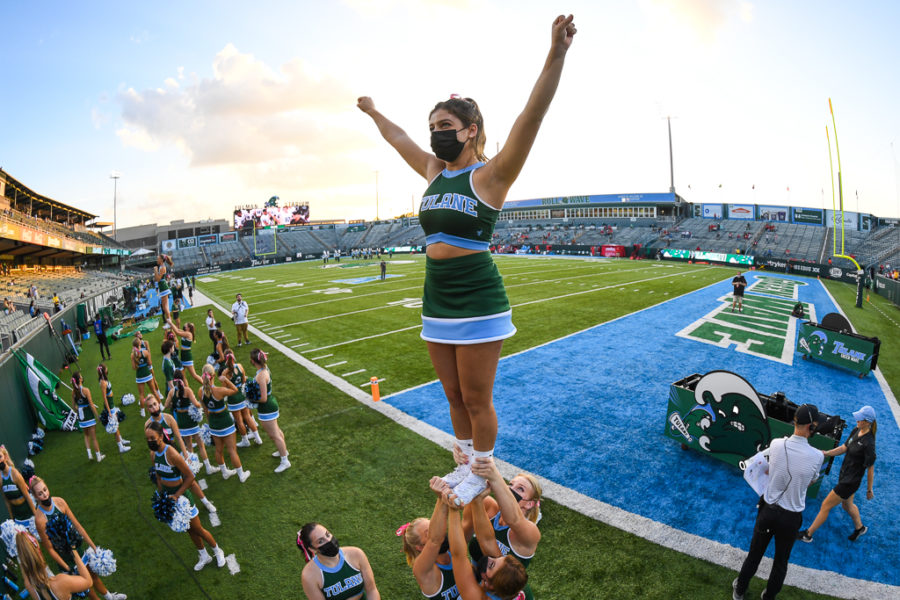Olympic recognition of cheerleading shifts landscape of sport
The Internation Olympic Committee’s decision to grant full recognition to cheerleading could drastically shift the cheer landscape, including here at Tulane University.
December 1, 2021
Cheerleading has been a critical aspect of sporting events for more than 140 years. The sport first appeared a few years after Princeton University and Rutgers University met for the first college football game in 1869. By the 1880s, Princeton had an all-male pep club to support its football team.
Over the years, the sport grew into what it is today. Women began joining pep clubs when young men left to fight during World War II. This saw the addition of skills such as tumbling passes and acrobatics to the sport, and cheerleaders began using spirit sticks and pom-poms.
The sport also saw the rise of competitive cheerleading with organizations such as the National Cheerleaders Association and the Universal Cheerleaders Association. While the NCAA does not recognize cheerleading as a sport, more than 250 colleges across all three NCAA division levels offer cheerleading programs.
However, cheerleading is finally beginning to experience a new landscape. On July 20, 2021, the International Olympic Committee voted in favor of granting full recognition to the International Cheer Union and cheerleading. The move comes after the sport received provisional recognition from the IOC in 2016, allowing cheerleading to receive funding and special grants.
The IOC recognition granted this year allows for funding of facilities, coaching equipment and coaches needed to compete in the Olympics. This funding that cheer could receive could give millions of cheerleaders around the world an opportunity to compete in the Olympics.
Anna Rodriguez, the captain of Tulane’s cheer team, began cheerleading in the third grade. She said she believes that cheerleading becoming an Olympic sport could cause people to have more respect for cheerleaders and the risks they put themselves through to pursue their sport.
She also added that it could have an impact on Tulane’s campus. “I would hope that it would gain more respect from not only the athletic department, but also the student body,” Rodriguez said. “My goal would be for us to have scholarships.”
While many argue that cheerleading is not a sport, cheerleading requires the same mental and physical strength as other sports. Tulane’s cheerleaders put themselves through the same safety risks as other sports just to be present at football and basketball games.
“It doesn’t really matter what they think, because I love what I do and I’m having fun being thrown up 20 feet in the air,” Rodriguez said. “People never respect a predominantly women’s sport like cheer just because that’s the way the world works.”
Teamwork is an integral part of cheerleading and the sport requires more dependable teammates than any other sport does. Cheerleaders work together as a unit, not as individuals, and every cheerleader puts their lives and safety into the hands of their teammates.
“It’s like the whole thing. It’s like the most important thing,” Rodriguez said. “If you aren’t on, if you don’t have chemistry with your bases, the people on the bottom, the person that they’re throwing is at risk of ultimately death from landing on your neck or et cetera, so you need to have teamwork.”
Despite 2024’s Paris Olympics consisting of 50% female athletes for the first time ever, the list of sports for the 2024 Olympics has been approved and cheerleading will not be in the Paris Games.
This means that the 2028 Games in Los Angeles is the earliest possible debut for Olympic cheerleading, but in order for cheerleading to be included in the Olympics, it would have to secure a majority vote from the IOC’s 102 international members.
The 2020 Olympics saw the addition of baseball, softball, karate, skateboarding, climbing and surfing. While recognition from the IOC is a major step, we can only hope that the IOC’s panel of voters approve cheerleading to appear in the 2028 Olympics to give the sport the true recognition it deserves.










Addison • Mar 29, 2022 at 1:18 pm
I do Competitive cheerleading and i think it’s so much fun and i think it should be a sport in the Olympics.
unknown • Apr 14, 2022 at 5:36 pm
yes!
anonymous • Feb 8, 2022 at 4:26 pm
People keep saying cheer isnt a sport. I used to do competitive cheer and i love it so much! I wish i could continue but unfortunetly i can’t. But I am so excited to be able to see this happenening and we can prove to everyone it is and will always be a sport.
milly • Dec 30, 2021 at 3:53 pm
school cheer is not a sport Allstar is if school cheer is in the Olympics then they can’t follow their own rules 99% sure its allstars
Candy Ulmer Cranch, M.Ed. • Dec 2, 2021 at 9:04 am
My late Mother, Ruth St.Martin Ulmer, Newcomb, Class of 1925 was one of the first female cheerleaders in the U.S. ! I still have her Tulane sweater and her scrapbooks in which she saved Western Union telegrams sent to her from folks visiting Tulane for one of her games ! She also played the drums in a Tulane Band, was a member of Newcomb’s Mandolin and Guitar Club, was an Art major, and played every sport. She also taught Ballroom Dancing ! Quite a spirit ! This article gave me great joy and I know that my Mother (nicknamed “Saint” due to her maiden name) is feeling the same up above. Thank you for including this news. Our family includes four generations of Newcomb and Tulane graduates !
Sincerely, Ruth (“Candy”) Ulmer Cranch, M.Ed., Newcomb Class of 1968.